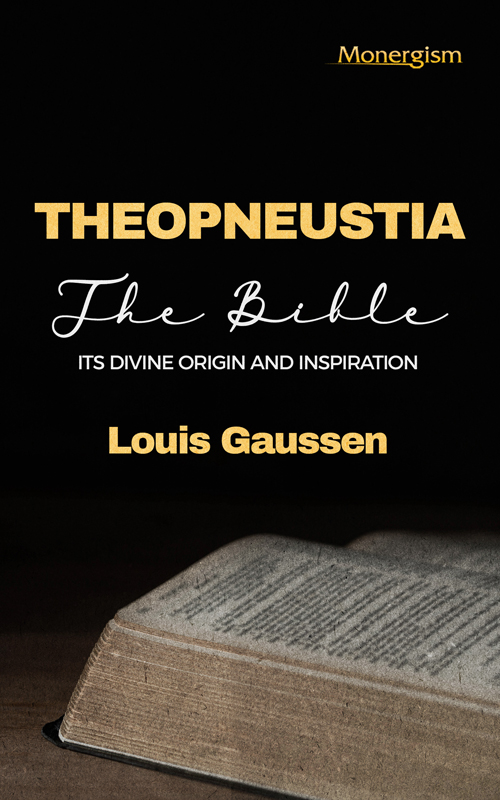 by Louis Gaussen
by Louis Gaussen
in ePub, .mobi & .pdf formats
This term is used for the mysterious power which the Divine Spirit put forth on the authors of the scriptures of the Old and New Testament, in order to their composing these as they have been received by the Church of God at their hands. "All Scripture," says an apostle, "is theopneustic."
This Greek expression, at the time when St Paul employed it, was new perhaps even among the Greeks; yet though the term was not used among the idolatrous Greeks, such was not the case among the Hellenistic Jews. The historian Josephus, a contemporary of St Paul's, employs another closely resembling it in his first book against Apion, when, in speaking of all the prophets who composed, says he, the twenty-two sacred books of the Old Testament,2 he adds, that they wrote according to the pneustia (or the inspiration) that comes from God. And the Jewish philosopher Philo,4 himself a contemporary of Josephus, in the account he has left us of his embassy to the emperor Caius, making use, in his turn, of an expression closely resembling that of St Paul, calls the Scriptures "theochrest oracles;" that is to say, oracles given under the agency and dictation of God.
Theopneustia is not a system, it is a fact; and this fact, like every thing else that has taken place in the history of redemption, is one of the doctrines of our faith.
-----
TABLE OF CONTENTS
TRANSLATOR'S PREFACE
PREFATORY OBSERVATIONS
CHAPTER I: DEFINITION OF THE THEOPNEUSTIA, OR DIVINE INSPIRATION
CHAPTER II: SCRIPTURAL PROOF OF THE DIVINE INSPIRATION
-- Section I.—All Scripture is Divinely Inspired
-- Section II.—All the Prophetic Utterances are given by God
-- Section III.—All the Scriptures of the Old Testament are Prophetic
-- Section IV.—All the Scriptures of the New Testament are Prophetic
-- Section V.—The Examples of the Apostles, and of their Master, attest that in their view all the Words of the Holy Books are given by God
CHAPTER III: BRIEF DIDACTIC ABSTRACT OF THE DOCTRINE OF THE DIVINE INSPIRATION
-- Section I.—Catechetical Sketch of the Main Points of the Doctrine
-- Section II.—On the Adversaries and Defenders of the Doctrine
CHAPTER IV: EXAMINATION OF OBJECTIONS
-- Section I.—The Translations
-- Section II.—Use of the Septuagint Translation
-- Section III.—The Various Readings
-- Section IV.—Errors of Reasoning or of Doctrine
-- Section V.—Errors in the Narratives—Contradictions in the Facts
-- Section VI.—Errors contrary to Natural Philosophy
-- Section VII.—The Declarations of Paul himself
CHAPTER V: EXAMINATION OF EVASIONS
-- Section I.—Might not Inspiration pertain to the Thoughts only, without extending to the Words?
-- Section II.—Should we except from Inspiration the Historical Books?
-- Section III.—Will the apparent insignificance of certain Details in the Bible authorize their being excepted from Inspiration?
CHAPTER VI: ON SACRED CRITICISM, IN THE RELATIONS IT BEARS TO DIVINE INSPIRATION
-- Section I.—Sacred Criticism is a Scientific Inquirer, and not a Judge
-- Section II.—Let Sacred Criticism be an Historian, not a Soothsayer
-- Section III.—Sacred Criticism is the Doorkeeper of the Temple, not its God
CHAPTER VII: CONCLUSION
-- Section I.—Retrospect
-- Section II
